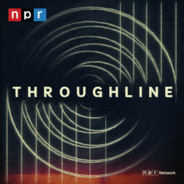
Kultur & Gesellschaft
Throughline Folgen
Throughline is a time machine. Each episode, we travel beyond the headlines to answer the question, "How did we get here?" We use sound and stories to bring history to life and put you into the middle of it. From ancient civilizations to forgotten figures, we take you directly to the moments that shaped our world. Throughline is hosted by Peabody Award-winning journalists Rund Abdelfatah and Ramtin Arablouei.Subscribe to Throughline+. You'll be supporting the history-reframing, perspective-shifting, time-warping stories you can't get enough of - and you'll unlock access bonus episodes and sponsor-free listening. Learn more at plus.npr.org/throughline
Folgen von Throughline
-
Folge vom 22.08.2024We The People: Canary in the Coal MineThe Third Amendment. Maybe you've heard it as part of a punchline. It's the one about quartering troops — two words you probably haven't heard side by side since about the late 1700s.At first glance, it might not seem super relevant to modern life. But in fact, the U.S. government has gotten away with violating the Third Amendment several times since its ratification — and every time it's gone largely unnoticed.Today on Throughline's We the People: In a time of escalating political violence, police forces armed with military equipment, and more frequent and devastating natural disasters, why the Third Amendment deserves a closer look.Learn more about sponsor message choices: podcastchoices.com/adchoicesNPR Privacy Policy
-
Folge vom 15.08.2024We The People: Equal ProtectionThe Fourteenth Amendment. Of all the amendments to the U.S. Constitution, the 14th is a big one. It's shaped all of our lives, whether we realize it or not: Roe v. Wade, Brown v. Board of Education, Bush v. Gore, plus other Supreme Court cases that legalized same-sex marriage, interracial marriage, access to birth control — they've all been built on the back of the 14th. The amendment was ratified after the Civil War, and it's packed full of lofty phrases like due process, equal protection, and liberty. But what do those words really guarantee us? Today on Throughline's We the People: How the 14th Amendment has remade America — and how America has remade the 14th (Originally ran as The Fourteenth Amendment).Learn more about sponsor message choices: podcastchoices.com/adchoicesNPR Privacy Policy
-
Folge vom 08.08.2024We The People: Legal RepresentationThe Sixth Amendment. Most of us take it for granted that if we're ever in court and we can't afford a lawyer, the court will provide one for us. And in fact, the right to an attorney is written into the Constitution's sixth amendment. But for most of U.S. history, it was more of a nice-to-have — something you got if you could, but that many people went without. Today, though, public defenders represent up to 80% of people charged with crimes. So what changed? Today on Throughline's We the People: How public defenders became the backbone of our criminal legal system, and what might need to change for them to truly serve everyone. (Originally ran as The Right to an Attorney).Learn more about sponsor message choices: podcastchoices.com/adchoicesNPR Privacy Policy
-
Folge vom 06.08.2024Tested: Questions of a Physical NatureIn 1966, the governing body of the Olympic track and field event started mandatory examinations of all women athletes. These inspections would come to be known as "nude parades," and if you were a woman who refused the test, you couldn't compete.We're going back almost a century to the first time women were allowed to compete in Olympic track and field games, and to a time when a committee of entirely men decided who was a female and who wasn't.Today on the show, we bring you an episode from a new podcast from CBC and NPR's Embedded called Tested.Learn more about sponsor message choices: podcastchoices.com/adchoicesNPR Privacy Policy
